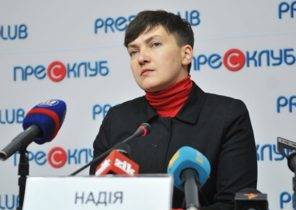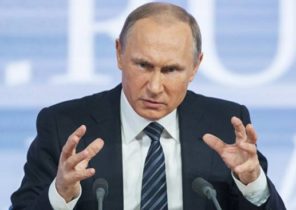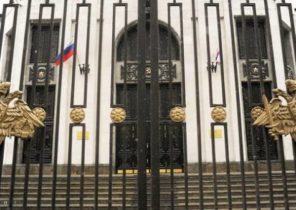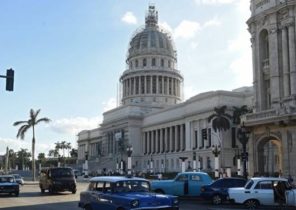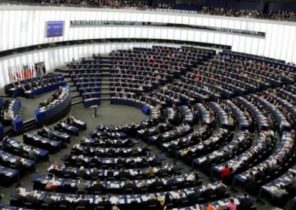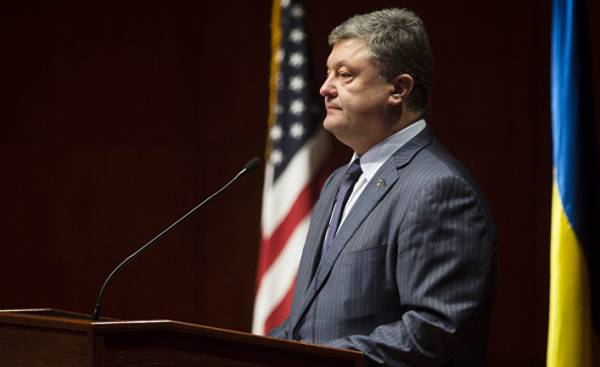
Last month, Ukrainian President Petro Poroshenko has significantly expanded sanctions of their country against Russia, by entering into several years of restrictive measures against a number of companies of information technologies. When these measures are fully implemented, they will affect about 25 million Ukrainians, that is, almost all Internet users.
And this is just another piece in a long series of sanctions, which Ukraine has started to introduce in 2014 after the annexation of Crimea by Russia. First, restrictions were imposed against the Russian television news programmes, then against artists, movies. Then against published in Russian books. And most recently Ukraine passed a law requiring that 75% of television programs were in the Ukrainian language. In this regard, a Western journalist accused Poroshenko that for him to be Ukrainian means to speak Ukrainian, and nothing more.
Critics say the government is trying to build a virtual wall around Ukraine in a vain attempt to protect her from Russian influence. They are worried that when this goal will be achieved, Kiev will try to impose on the country a nationalist course, blaming the unreliability of Eastern Ukrainians, who are mostly affected by cultural sympathy and closeness to Russia.
These fears only intensified in connection with the review of such people as the Ukrainian Minister of culture Yevhen Nyshchuk, who was named Eastern Ukrainians, the product of “flawed genetics” and “lack consciousness”, or the head of the military and civil administration of the Donetsk oblast Pavlo Zhebrovsky, who said that after the return of the region under the authority of the Kiev government “these people impose democratic norms”, placing in every major city in the East garrison of Ukrainian troops.
But there are those who oppose such restrictive measures, because it is impossible to implement them fully, and because they are untenable. These people indicate that banned a popular website Yandex is a global enterprise like Google and Bing, and that it is registered in the Netherlands. Its Ukrainian branch Yandex.Ua in legal terms is separate from the Russian parent company, and in addition, is one of the country’s largest taxpayers.
Ban the most popular and widely used software tools many seemed particularly odd, because they are created in Ukraine, and the company just received from the Ukrainian government certificate, which States that the product meets government safety standards.
The government justifies its actions by the need to enhance national security in the war with Russia. But even sympathetic observers Ukraine do not understand how to enhance national security, denying Ukrainians access the most popular in Kiev the application to call a taxi or to the accounting programs used by most companies when paying taxes.
But most alarming was another. President Poroshenko and his advisers do not understand that millions of Ukrainians see in these actions an attack on their heritage and way of life. Many citizens still believe that the Russian cultural and religious identity is not the direct opposite of their Ukrainian identity, but complements it.
In November 2016, the Kiev Razumkov Center conducted a study, which was widely covered by Ukrainian media. Sociologists have found that half of Ukrainians consider Russians and Ukrainians “a fraternal Nations,” and a quarter calls them “one people.” Not Russian propaganda, but the continued attacks of the state on cultural, religious and ethnic identity make the most of the inhabitants of Eastern and southern Ukraine to believe that the uprising on the Maidan in 2014 was “illegal armed coup d’etat”.
So these Ukrainians it is not the sanctions against Russia. It sanctions against them, against the “other Ukraine”, which does not agree with the current policy of severing all ties with Russia and the rewriting of the history of the country.
As evidence they point to the fact that the latest sanctions are just the tip of the iceberg. Now pending in the Ukrainian Parliament are at least four legislative initiative on making amendments to the law on language. He is considered too liberal, because it allows regions where at least 10% of the population speak a second language, use it as the official. When this law was passed in 2012, almost half of Ukrainian regions without delay made the official language of Russian. Every new proposal today in varying degrees, aimed at limiting public use of the Russian language.
And recently, quotas were introduced, according to which 75% of the programs on national television during the evening hours should go in the Ukrainian language. These measures are clearly directed not to reduce the presence in Ukraine Russian news media because they were banned in 2014. This is an attempt to silence the Russian-speaking Ukrainians, deprived of their public voice.
In a country where in 2012 more than 60% of Newspapers, 83% of journals and 87% of books, and 72% of television programs were published in the Russian language, and where over 60% of citizens declare that at home and with friends they communicate in Russian, the government delivers a clear message about your commitment to the isolation of the people and not to their Association. As said before the vote the speaker of the Ukrainian Parliament Andrei Parubiy, “the word is a weapon, and the weapon not to give to enemy”.
But there is also a positive moment. At the insistence of the Ukrainian security forces, the country’s Parliament took a step back and began to plunge the country into an open religious war, postponing a vote on restoring the Soviet practice the draft law, according to which all high-ranking clergy of the canonical Ukrainian Orthodox Church should be administered under the supervision of the state. The government is attacking the Church because she does not want to renounce brotherly relations with the Russian Orthodox Church and calls continuing in the East Ukraine conflict a civil war.
What state are steeped in powerful economic and political crisis (there are more than a year there is no official parliamentary majority), including ways to increase tension? The reason is that incitement to hatred of Russia provides short-term political benefits.
First, this tension provides Ukraine international support and funding. Second, it distracts the attention of the Ukrainian population from unpopular economic reforms. In addition, the tension allows Poroshenko, a support level which fell to a critically low level, to lead the country as President in wartime. Finally, doubts about the loyalty of those who live on the East and South (not to mention the Donbas and the Crimea, who completely excluded from political discussions), allow you to keep the nationalist agenda, which is supported by the majority in the West of Ukraine. Although in 2015, Poroshenko said that these regions are “the Foundation of Ukrainian statehood”, such a truncated Ukrainian identity that is created solely on the basis of history, religion and culture of the Western regions of the country, is not enough to create a Foundation of national unity.
The current policy of humiliation of those who feel inferior Ukrainians, will only lead to split the country along ethnic and religious lines. It can still be prevented — if the government will uphold a non-discriminatory culture in civil society, respect for Ukrainian identity based on two cultures.
Adherence to this policy or rejection of it determines the heritage of Maidan. In the first case, these events will be remembered as the coming of a new era of national unity, and the second as the beginning of the disintegration of Ukraine.
Nicolai Petro is Professor of political science at the University of Rhode island studying issues of peace and non-violence. He is the editor of the book Crisis in Ukraine. Currently, Peter lives in Odessa.
Josh Cohen is a former employee of the USAID project on economic reforms in the former Soviet Union. He writes for various publications on topics of foreign policy, lives in Washington.

